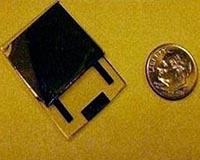 |
Calgary, Alberta (UPI) Oct 20, 2009 Canadian scientists say they have discovered a new material that can help increase the efficiency and decrease the cost of fuel cells. University of Calgary chemists Jeff Hurd and Professor George Shimizu said they discovered a material that allows a fuel cell -- known as a polymer electrolyte membrane fuel cell -- to work at a higher temperature. That, they said, is extremely important in terms of increasing the efficiency and decreasing the cost of PEM fuel cells. "This research will alter the way researchers have to this point perceived candidate materials for fuel cell applications," Shimizu said. The study that included Ramanathan Vaidhyanathan and Venkataraman Thangadurai of the University of Calgary and Christopher Ratcliffe and Igor Moudrakovski of the Steacie Institute for Molecular Sciences appears in the early online edition of the journal Nature Chemistry. Share This Article With Planet Earth
Related Links Powering The World in the 21st Century at Energy-Daily.com
 Radioisotope battery under development
Radioisotope battery under developmentColumbia, Mo. (UPI) Oct 8, 2009 U.S. electrical engineers say they are developing a smaller, lighter and more efficient battery that uses a nuclear energy source. Much attention has been given to making batteries smaller and more powerful, but scientists say problems can arise when such batteries become heavier than the devices they power. "To provide enough power, we need certain methods with high energy ... read more |
|
| The content herein, unless otherwise known to be public domain, are Copyright 1995-2009 - SpaceDaily. AFP and UPI Wire Stories are copyright Agence France-Presse and United Press International. ESA Portal Reports are copyright European Space Agency. All NASA sourced material is public domain. Additional copyrights may apply in whole or part to other bona fide parties. Advertising does not imply endorsement,agreement or approval of any opinions, statements or information provided by SpaceDaily on any Web page published or hosted by SpaceDaily. Privacy Statement |